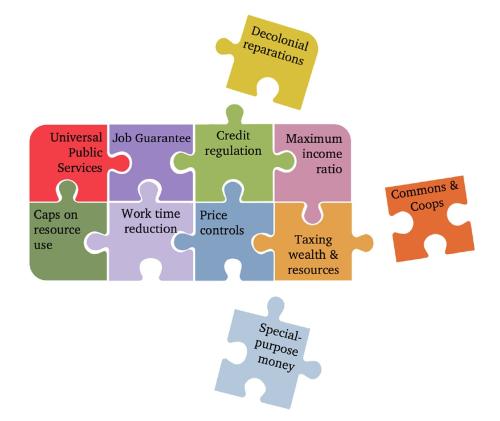How to pay for saving the world: Modern Monetary Theory for a degrowth transition

How to pay for saving the world: Modern Monetary Theory for a degrowth transition
Study introducing the potential synergies between Modern Monetary Theory and Degrowth to address environmental and social challenges.
Presenting significant challenges on environmental and economic issues, the authors offer intersecting and complementary elements of Modern Monetary Theory and the concept of Degrowth.
The paper critiques current methodologies for solving some of today's most pressing problems and offers policy approaches from these two emerging streams of thought for tackling them. Noting that these two movements are moving in similar directions but from different perspectives, the authors argue for a selective combination of policies, principally for developed countries, including caps on resource use, job guarantees, and re-envisioning of taxation and social supports among many others. The paper helps to advance the concept that policies from these schools can be complementary and beneficial.
Paper abstract: "Degrowth lacks a theory of how the state can finance ambitious social-ecological policies and public provisioning systems while maintaining macroeconomic stability during a reduction of economic activity. Addressing this question, we present a synthesis of degrowth scholarship and Modern Monetary Theory (MMT) rooted in their shared understanding of money as a public good and their common opposition to artificial scarcity. We present two arguments. First, we draw on MMT to argue that states with sufficient monetary sovereignty face no obstacle to funding the policies necessary for a just and sustainable degrowth transition. Increased public spending neither requires nor implies GDP growth. Second, we draw on degrowth research to bring MMT in line with ecological reality. MMT posits that fiscal spending is limited only by inflation, and thus the productive capacity of the economy. We argue that efforts to deal with this constraint must also pay attention to social and ecological limits. Based on this synthesis we propose a set of monetary and fiscal policies suitable for a stable degrowth transition, including a stronger regulation of private finance, tax reforms, price controls, public provisioning systems and an emancipatory job guarantee. This approach can support broad democratic mobilization for a degrowth transition."
By Christopher Olk, Colleen Schneider, and Jason Hickel, published in Ecological Economics, volume 214
HT: Kate Rudd
